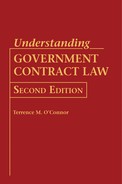PART I
THE PARTIES TO A GOVERNMENT CONTRACT
How’s this for an impossible job description:
Contracting officers are responsible for ensuring performance of all necessary actions for effective contracting, ensuring compliance with the terms of the contract, and safeguarding the interests of the United States in its contractual relationships.
This is the best summary of the contracting officer’s job in all the law dealing with contracting officers, and it’s from Federal Acquisition Regulation (FAR) 1.602-2. From this quote, it’s clear that a contracting officer is supposed to be a protector of the government’s interests—an advocate for the government in the same way lawyers are to be advocates solely for their clients.
But then this same FAR section goes on to throw the contracting officer a curve, or perhaps a U-turn. In “safeguarding the interests of the United States,” the contracting officer, according to FAR 1.602-2(b), is supposed to “ensure that contractors receive impartial, fair, and equitable treatment.”
So, a contracting officer is supposed to be a judge who treats a contractor fairly and reasonably.
But whose side is the contracting officer on—the government’s side, similar to a sheriff protecting the government’s interests? Or no one’s side (neither the government’s nor the contractor’s), just as a judge?
Unfortunately, FAR has no answer. Having created this tension between the contracting officer as a guardian of the government’s interests and the contracting officer as a judge, FAR does not say much about how the contracting officer is supposed to do this job. There is no instruction manual for contracting officers describing how to do the job FAR gives them.
And if there is no instruction manual for one party to the government contract—the contracting officer—how can the other party—the contractor—anticipate what the contracting officer is supposed to do?
Part I starts by looking at all aspects of the contracting officer’s job.
In chapter 1, we look at the contracting officer as a judge. In this role, contracting officers must follow two basic rules: they must be fair and reasonable, and they must make independent decisions—that is, decisions made without pressure from their lawyers, their bosses, or their auditors.
In chapter 2, we look at the other job the contracting officer has— safeguarding the government’s interests. We look at how a contracting officer protects the taxpayers and the U.S. Department of the Treasury.
In chapter 3, we look at one of the downsides of the contracting officer’s job—the contracting officer as defendant. An unfortunate and rare role a contracting officer might play is that of a defendant in a lawsuit brought by a contractor or by a member of the public injured during a contract.
In chapter 4, we look at the flip side—the uncertain, evolving law regarding the contracting officer as a plaintiff. One part of this role is bounty hunting. Because members of the public can turn into whistle-blowers and share in any fraud recovery to which they lead the government, a contracting officer may earn one of these lucrative recoveries as well. We also look at whether a contracting officer can sue members of the public for acts like defamation of character.
In chapter 5, we look at the government contractor and the most common problems a contractor finds. These include making sure the government employee involved has the authority to do the deal (because a deal made with unauthorized government employees typically ends in no contract with the government); avoiding the “bait and switch” tactic, which is defined as promising to provide one set of personnel and then switching to another set after the contract has been won; and avoiding fraud.
